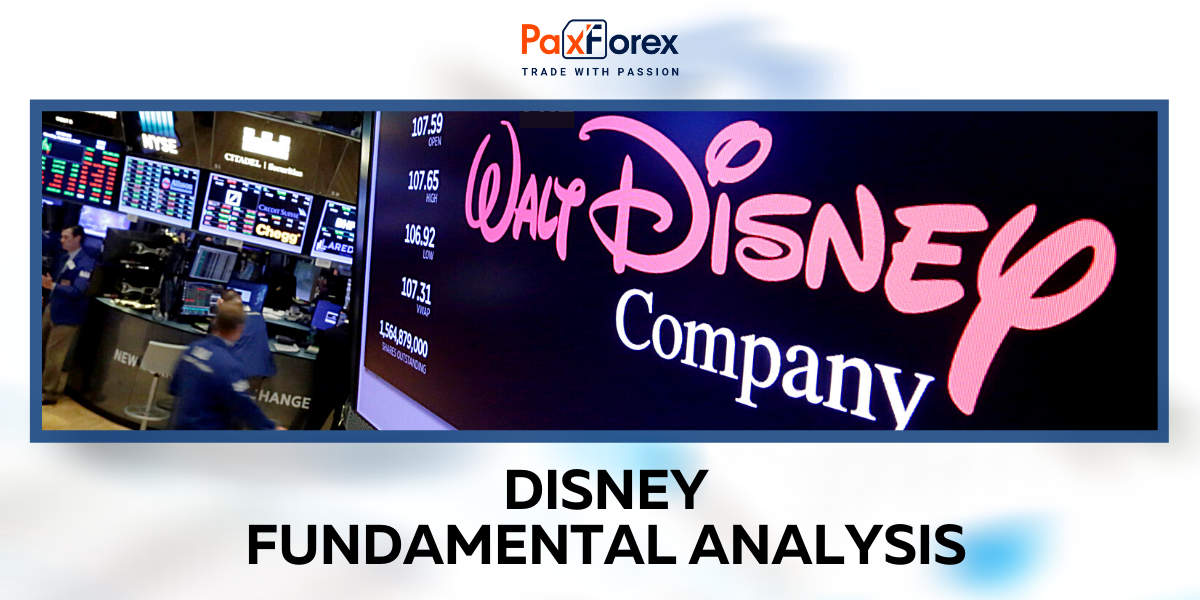
Source: PaxForex Premium Analytics Portal, Fundamental Insight
Despite this year's market decline, Walt Disney looked set to thrive in 2022. The economic revival has led to a boom in tourist demand that has supported Disney's theme parks, and its streaming business has seen strong growth in subscribers since it launched Disney+ three years ago.
This year, however, the company's stock is collapsing -- down nearly 40 percent since the beginning of the year -- and its fiscal fourth-quarter earnings report has brought investors another disappointment.
The entertainment giant fell short of analysts' forecasts by a wide margin on both the top and bottom lines. Revenue for the quarter rose just 9% to $20.15 billion, below forecasts of $21.36 billion. Adjusted earnings per share, meanwhile, actually fell from $0.37 to $0.30 as the streaming segment's loss increased significantly, well below consensus forecasts of $0.57.
As an entertainment conglomerate, Disney is a complex business, and no one segment determines its overall performance. While the company's theme parks performed strongly this quarter, the rest of the business was weak. The direct-to-consumer (DTC) segment in particular appears to have been the culprit for the slip and the stock's 7% drop in over-the-counter trading.
Disney's DTC segment, which includes streaming services such as Disney+, ESPN+, Hulu, and Hotstar, posted an operating loss of $1.47 billion, down from $630 million. While one might think that the growing losses were justified by the rapid growth of the DTC business, they were not.
Revenues in that segment rose only 8% to $4.9 billion. Presumably, growth was at least a few points higher in constant currency as the dollar has strengthened significantly over the past year, but the company did not report results in constant currency.
Disney+ posted strong growth in the quarter, adding 1.9 million subscribers in the quarter and 7.3 million internationally (not including Disney+ Hotstar), but average revenue per user from Disney+ subscribers domestically fell 10% year over year to $6.10 as a package that includes Hulu and ESPN+ for $13.99 per month seemed to attract new subscribers.
Disney has restructured its business, making streaming a major focus of its video entertainment division. However, the fourth quarter results are hardly inspiring: streaming losses increased by nearly $1 billion while revenue grew by only a single digit. In addition, the growth of streaming is taking a toll on the highly profitable linear TV business, although Disney has been forced to enter the streaming business because of the success of competitors such as Netflix.
Despite the weak performance, executives were optimistic that the company would meet its profitability goal in the streaming segment by the fiscal year 2024.
During the earnings call, Bob Chapek cited three factors that would negate DTC's $4 billion operating loss for the year. First, the company's planned launch of an ad tier on Disney+ will give the bottom line a boost. Unlike Netflix, Disney is not offering a lower price for the ad tier but is adding advertising to the Disney+ membership for $7.99 and offering an ad-free tier for $10.99/month.
In addition, the company plans to cut marketing costs and streamline its approach to content and distribution. Management also said that losses in the segment have peaked, and it expects that they will begin to decline in the current quarter.
There's no doubt that Disney's performance as a stock and as a company has been disappointing this year, but the company's transition to streaming has never been quick, and management originally planned to reach profitability by 2024. Setting aside the $1.5 billion in operating losses from streaming this quarter, Disney's total segment operating profit would have doubled, showing just how much of an impact streaming has had on the company.
Meanwhile, the theme park business is posting impressive results. In the parks, entertainment, and products segment, operating profits more than doubled to $1.5 billion -- and that's when the Shanghai park was closed.
Despite the weak results, the entertainment company's stock may be about to reach a tipping point when it launches ad-based streaming. The company still has a wealth of intellectual property that gives it a competitive advantage, and the streaming business could become profitable in a few years.
Selling now, when losses are expected to decline, and the streaming business does not yet have an opportunity to prove itself, could be a big mistake.
As long as the price is below 97.00, follow the recommendations below:
- Time frame: D1
- Recommendation: short position
- Entry point: 86.44
- Take Profit 1: 80.00
- Take Profit 2: 70.00
Alternative scenario:
If the level of 97.00 is broken-out, follow the recommendations below:
- Time frame: D1
- Recommendation: long position
- Entry point: 97.00
- Take Profit 1: 102.00
- Take Profit 2: 107.00













